七下英语unit1课文原文
江苏译林英语课本七下Unit1课文翻译(A5打印)
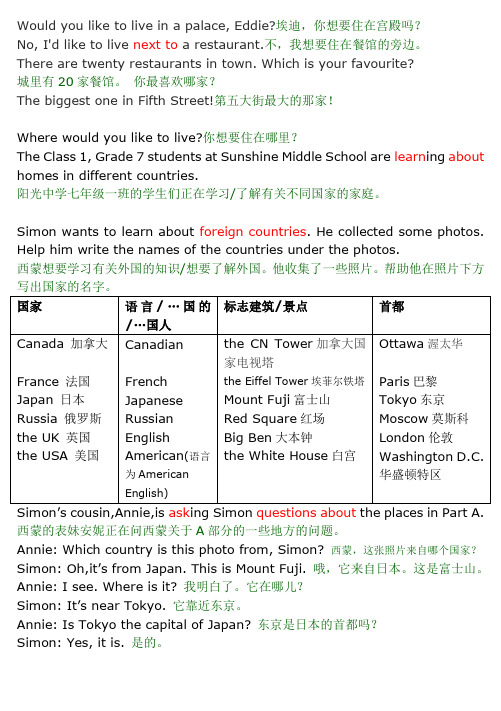
Would you like to live in a palace, Eddie?埃迪,你想要住在宫殿吗?No, I'd like to live next to a restaurant.不,我想要住在餐馆的旁边。
There are twenty restaurants in town. Which is your favourite?城里有20家餐馆。
你最喜欢哪家?The biggest one in Fifth Street!第五大街最大的那家!Where would you like to live?你想要住在哪里?The Class 1, Grade 7 students at Sunshine Middle School are learn ing about homes in different countries.阳光中学七年级一班的学生们正在学习/了解有关不同国家的家庭。
Simon wants to learn about foreign countries. He collected some photos. Help him write the names of the countries under the photos.西蒙想要学习有关外国的知识/想要了解外国。
他收集了一些照片。
帮助他在照片下方写出国家的名字。
西蒙的表妹安妮正在问西蒙关于A部分的一些地方的问题。
Annie: Which country is this photo from, Simon? 西蒙,这张照片来自哪个国家?Simon: Oh,it’s from Japan. This is Mount Fuji. 哦,它来自日本。
这是富士山。
Annie: I see. Where is it? 我明白了。
它在哪儿?Simon: It’s near Tokyo. 它靠近东京。
Annie: Is Tokyo the capital of Japan? 东京是日本的首都吗?Simon: Yes, it is. 是的。
七下英语书第一单元课文
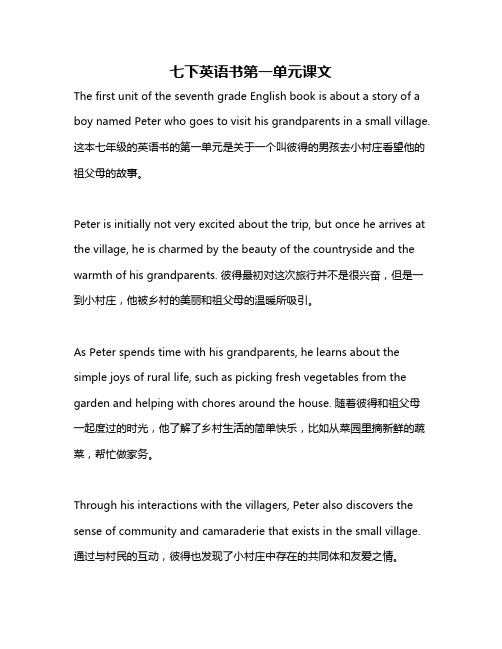
七下英语书第一单元课文The first unit of the seventh grade English book is about a story of a boy named Peter who goes to visit his grandparents in a small village. 这本七年级的英语书的第一单元是关于一个叫彼得的男孩去小村庄看望他的祖父母的故事。
Peter is initially not very excited about the trip, but once he arrives at the village, he is charmed by the beauty of the countryside and the warmth of his grandparents. 彼得最初对这次旅行并不是很兴奋,但是一到小村庄,他被乡村的美丽和祖父母的温暖所吸引。
As Peter spends time with his grandparents, he learns about the simple joys of rural life, such as picking fresh vegetables from the garden and helping with chores around the house. 随着彼得和祖父母一起度过的时光,他了解了乡村生活的简单快乐,比如从菜园里摘新鲜的蔬菜,帮忙做家务。
Through his interactions with the villagers, Peter also discovers the sense of community and camaraderie that exists in the small village. 通过与村民的互动,彼得也发现了小村庄中存在的共同体和友爱之情。
As the story progresses, Peter's initial reluctance towards the trip transforms into a deep appreciation for the value of family, tradition, and connection to one's roots. 随着故事的发展,彼得最初对这次旅行的不情愿变成了对家庭、传统和对根的联系价值的深刻赞赏。
英语七下第一单元课文译林版
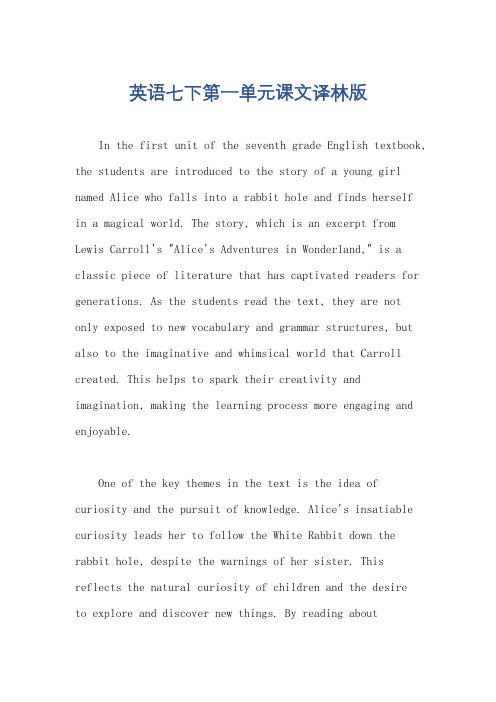
英语七下第一单元课文译林版In the first unit of the seventh grade English textbook, the students are introduced to the story of a young girl named Alice who falls into a rabbit hole and finds herselfin a magical world. The story, which is an excerpt from Lewis Carroll's "Alice's Adventures in Wonderland," is a classic piece of literature that has captivated readers for generations. As the students read the text, they are not only exposed to new vocabulary and grammar structures, but also to the imaginative and whimsical world that Carroll created. This helps to spark their creativity and imagination, making the learning process more engaging and enjoyable.One of the key themes in the text is the idea of curiosity and the pursuit of knowledge. Alice's insatiable curiosity leads her to follow the White Rabbit down the rabbit hole, despite the warnings of her sister. This reflects the natural curiosity of children and the desireto explore and discover new things. By reading aboutAlice's adventures, students are encouraged to embracetheir own curiosity and to be open to new experiences and knowledge. This can help to foster a love of learning and a sense of wonder about the world around them.Another important theme in the text is the concept of change and transformation. As Alice navigates through Wonderland, she encounters a series of bizarre and fantastical events that challenge her understanding of reality. She grows and shrinks in size, meets talking animals, and experiences a topsy-turvy world where nothing is as it seems. This theme of change can be particularly relevant to students who are going through their own period of growth and development. It encourages them to embrace change and to be open to new perspectives and experiences.The text also introduces students to the concept of nonsense literature, which is characterized by its use of absurd and illogical elements. This can be a fun and entertaining way for students to explore the English language and to expand their understanding of literary genres. By engaging with nonsense literature, students candevelop their critical thinking skills and learn to appreciate the playful and imaginative use of language.In addition to the literary themes and languagelearning opportunities, the text also provides valuable cultural insights. "Alice's Adventures in Wonderland" is a classic work of English literature that has had asignificant impact on popular culture. It has been adapted into numerous films, plays, and other forms of media, andits characters and imagery have become iconic symbols. By studying this text, students can gain a deeperunderstanding of the cultural significance of the story and its enduring appeal.Overall, the first unit of the seventh grade English textbook offers students a rich and engaging learning experience. Through the story of Alice's adventures in Wonderland, students are exposed to important literary themes, language learning opportunities, and cultural insights. This not only helps to improve their English language skills, but also fosters a love of literature anda sense of curiosity and wonder about the world around them.。
七年级下册英语unit1-10课文原文

七年级下册英语unit1-10课文原文Unit 1n A 2dBob and Jane are discussing which club to join。
Bob wantsto join a sports club and he can play soccer。
so Jane suggests he join the soccer club。
Jane is good at telling stories。
so Bob suggests she join the story telling club。
Jane also likes to draw。
so Bob suggests she join both the story telling club and the art club。
They both agree to join the clubs.n B 2a___ introduces himself and says ___ introduces himself and says he can play ping pong and ___ with people。
Alan introduces himself and says he is in the school music club。
He can play the guitar and piano。
and he can sing and dance too.2bAd A is for help for old people。
Ad B is for a music teacher wanted。
and Ad C is for help with sports in English.___: Yes。
it is。
But since my work le is different from most people。
my meal times are also different。
七下第一单元英语课文
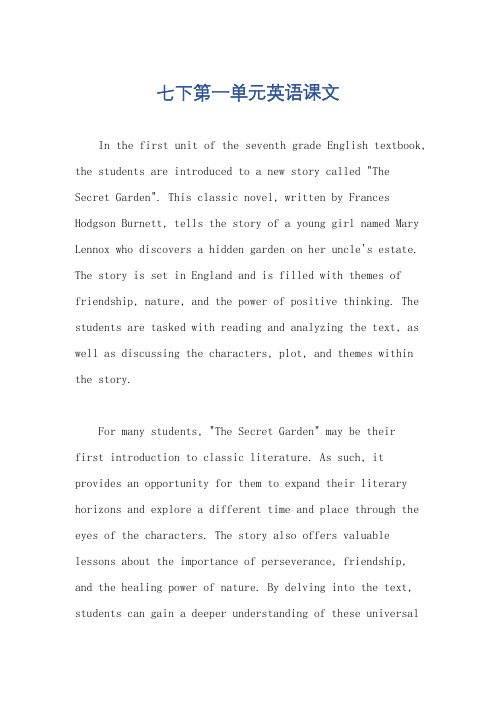
七下第一单元英语课文In the first unit of the seventh grade English textbook, the students are introduced to a new story called "The Secret Garden". This classic novel, written by Frances Hodgson Burnett, tells the story of a young girl named Mary Lennox who discovers a hidden garden on her uncle's estate. The story is set in England and is filled with themes of friendship, nature, and the power of positive thinking. The students are tasked with reading and analyzing the text, as well as discussing the characters, plot, and themes within the story.For many students, "The Secret Garden" may be theirfirst introduction to classic literature. As such, it provides an opportunity for them to expand their literary horizons and explore a different time and place through the eyes of the characters. The story also offers valuable lessons about the importance of perseverance, friendship, and the healing power of nature. By delving into the text, students can gain a deeper understanding of these universalthemes and apply them to their own lives.One of the key aspects of studying "The Secret Garden"is the opportunity for students to develop their critical thinking skills. As they read, they are encouraged to analyze the characters' motivations, the development of the plot, and the author's use of language and imagery. By engaging with the text on a deeper level, students can improve their comprehension and interpretation skills, as well as their ability to articulate their thoughts and opinions about the story.In addition to the literary aspects of "The Secret Garden", the story also offers opportunities for cross-curricular learning. For example, students can explore the historical context of the novel, learning about theVictorian era and the social and cultural norms of the time. They can also delve into scientific concepts related to the garden and the natural world, and even explore the themesof mental health and well-being that are prevalent throughout the story. This interdisciplinary approachallows students to make connections between differentsubject areas and gain a more holistic understanding of the text.Furthermore, "The Secret Garden" provides a platformfor students to engage in discussions about empathy, resilience, and the power of positive thinking. The characters in the story face various challenges and obstacles, and it is through their determination and support for one another that they are able to overcome these difficulties. By exploring these themes, students can reflect on their own experiences and consider how they can apply the lessons from the story to their own lives. This can help them develop a greater sense of empathy and understanding for others, as well as a more positive and resilient mindset.Finally, studying "The Secret Garden" can also inspire students to explore their own creativity and imagination. The story is filled with vivid descriptions of the natural world, and students can use these as a springboard fortheir own creative writing and artistic endeavors. They may be inspired to write their own stories, create artworkdepicting the garden, or even design their own imaginary worlds. This can foster a sense of creativity and self-expression, as well as a deeper appreciation for the beauty and wonder of the natural world.In conclusion, the first unit of the seventh grade English textbook, which introduces the classic novel "The Secret Garden", offers students a rich and multifaceted learning experience. Through the exploration of literary, historical, scientific, and thematic elements, students can develop their critical thinking skills, empathy, and creativity. The story provides a valuable opportunity for students to expand their horizons, gain a deeper understanding of universal themes, and apply these lessons to their own lives. As they delve into the world of "The Secret Garden", students can embark on a journey of discovery, reflection, and personal growth.。
(完整版)人教版七下英语课文

Unit 1 Can you play the guitar?Jane: Hi, Bob. What club do you want to join?Bob: I want to join a sports club.Jane: Great! What sports can you play?Bob: Soccer.Jane: So you can join the soccer club.Bob: What about you? You’re very good at telling stories. You can join the story telling club.Jane: Sounds good. But I like to draw, too.Bob: Then join two clubs, the story telling club and the art club!Jane: OK, let’s join now.1.Hello, I’m Peter. I like to play basketball. I can speak English and I can also play soccer.2.Hi, I’m Ma Huan. I can play ping-pong and chess. I like to talk and play games with people.3.My name’s Alan. I’m in the school music club. I can pl ay the guitar and the piano. I can sing and dance, too.A、Help for old peopleWe need help at the old people’s home. Are you free in July? Are you good with old people? Can you talk to them and play games with them? They can tell you stories, and you can make friends. It is interesting and fun! Please call us at 689-7729 today!B、Music teacher wantedCan you play the piano or the violin? Do you have time on the weekend? The school needs help to teach music. It is not difficult! Please call Mrs. Miller at 555-3721.C、Help with sports in EnglishAre you busy after school? No? can you speak English? Yes? Then we need you to help with sports for English-speaking students. It is relaxing and easy!Please came to the Students’ Sport Center. Call Mr. Brown at 293-7742.Unit 2 What time do you go to school?Interviewer: Scott has an interesting job. He works at a radio station. Scott, what time is your radio show?Scott: From twelve o’clock at night to six o’clock in the morning. Interviewer: What time do you usually get up?Scott: At eight thirty at night. Then I eat breakfast at nine.Interviewer: That’s a funny time for breakfast!Scott: Yeah. After that, I usually exercise at about ten twenty.Interviewer: When do you go to work? At eleven o’clock, so I’m never late for work.Hi! I’m Tony. I don’t like to get up early. In the morning, I get up at eight. Then I go to school at eight thirty. I don’t have much time for breakfast, so I usually eat very quickly. For lunch, I usually eat hamburgers. After school, I sometimes play basketball for half an hour. When I get home, I always do my homework first. In the evening, I either watch TV or play computer games. At ten thirty, I brush my teeth and then I go to bed. Mary is my sister. She usually gets up at six thirty. Then she always takes a shower and eats a good breakfast. After that, she goes to school at eight thirty. At twelve, she eats lots of fruit and vegetables for lunch. After lunch, she sometimes plays volleyball. She always eats ice-cream after dinner. She knows it’s not good for her, but it tastes good! In the evening, she does her homework and usually swims or takes a walk. At nine thirty, she goes to bed.Unit 3 How do you get to school?Lisa: Hey, Jane. Is this your new bike?Jane: Yes, I ride it to school every day. How do you get to school?Lisa: I usually take the bus.Jane: How far is it from your home to school?Lisa: I’m not sure… about 10 kilometers. The bus ride takes about 20 minutes. How long does it take you to get to school?Jane: About 15 minutes by bike. It’s good exercise.Lisa: Yeah. Well, have a good day at school.Jane: You, too.Crossing the river to schoolHow do you get to school? Do you walk or ride a bike? Do you go by bus or by train? For many students, it is easy to get to school. But for the students in one small village in China, it is difficult. There is a very big river between their school and the village. There is no bridge and the river runs too quickly for boats. So these students go on a ropeway to cross the river to school.One 11-year-old boy, Liangliang, crosses the river every school day. But he is not afraid because he loves school. “I love to play wi th my classmates. And I love my teacher. He’s like a father to me.” Many of the students and villagers never leave the village. It is their dream to have a bridge. Can their dream come true?Unit 4 Don’t eat in classJohn: Hi, my name’s John. It’s my first day at school.Alice: Hi, John. I’m Alice. This is a great school, but there are a lot of rules. John: Really? What are some of the rules?Alice: Well, don’t be late for class. This is very important.John: OK, so we must be on time. Can we bring music players to school? Alice: No, we can’t. and we always have to wear the school uniform.John: I see.Alice: Oh, and we also have to be quite in the library.Dear Dr. Know,There are too many rules! At 6:00 a.m., my mom says, “Get up now and make your bed!” After breakfast, my mom always says, “Don’t leave the dirty dishes in the kitchen!” After that, I run to school because I can’t be late. At school, we have more rules--- don’t be noisy, don’t eat in class, …My dad says I c an’t play basketball after school because I must do my homework. I can play only on weekends. After dinner, I can’t relax either. I must read a book before I can watch TV. But I have to go to bed before 10:00. Rules, rules, rules! It’s terrible! What can I do, Dr. Know?Molly Brown, New YorkDear Molly,I know how you feel. People always tells us, “Don’t do this!” or “You can’t do that!” But think about it, Molly. There are a lot of things you can do. You can play basketball on weekends. You can watch TV after you read a book. Parentsand schools are sometimes strict but remember, they make rules to help us. We have to follow them.Good luck!Dr. KnowUnit 5 Why do you like pandas?Jenny: Your dos is really cute, Peter!Peter: He’s my new pet, Dingding. He’s very smart.Jenny: Really? What can he do?Peter: He can walk on two legs. He can dance, too.Jenny: Wow!Peter: Does your family have a pet?Jenny: My mom has a big cat, but I don’t like her.Peter: Why don’t you like the cat?Jenny: W ell, because she’s kind of boring. She sleeps all day, and her name is Lazy.Peter: Haha, then that’s a good name for her!Hello. We are students from Thailand, and we want to save the elephants. The elephant is one of Thailand’s symbols. Our first flag had a white elephant on it. This is a symbol of good luck.Elephants are smart animals. They can play soccer or music. They can also draw very well. People say that “an elephant never forgets”. Elephants can walk for a long time and never gets lost. They can also remember places with food and water. This helps them to live.But elephants are in great danger. People cut down many trees so elephants are losing their homes. People also kill elephants for their ivory. Today there are only about 3000 elephants (over 100,000 before). We must save the trees andnot buy things made of ivory. Remember that March 13th is Thai Elephant Day.Unit 6 I’m watching TVJenny: Hello? This is Jenny.Laura: Hi, Jenny. It’s Laura here.Jenny: Oh, hi, Laura. What are you doing?Laura: Not much. I’m just washing my clothes. What about you?Jenny: I’m watching TV. Do you want to join me for dinner? My parents aren’t at home. We can eat out.Laura: Yeah. I’d love to.Jenny: Let’s meet at my home first. Come a t half past six.Laura: OK. See you then.Today’s story is about Zhu Hui, a student from Shenzhen. He’s now studying in the United States. He’s living with an American family in New York. Today is the Dragon Boat Festival. It’s 9:00 a.m. and Zhu Hui’s family are at home. His mom and aunt are making zongzi. His dad and uncle are watching the boat races on TV.Is Zhu Hui also watching the races and eating zongzi? Well, it’s 9:00 p.m. in New York, and it’s the night before the festival. But there isn’t a Dragon Boat Festival in the US, so it’s like any other night for Zhu Hui and his host family. The mother is reading a story to her young children. The father is watching a soccer game on TV. And what’s Zhu Hui doing? He’s talking on the phone to his cousin in Shenzhen. Zhu Hui misses his family and wishes to have his mom’s delicious zongzi. Zhu Hui likes New York and his host family a lot, but there’s still “no place like home”.Unit 7 It’s rainingRick: Hello, Rick speaking.Steve: Hi, Rick. It’s Steve. How’s it going?Rick: Not bad, thanks. The weather’s great. What are you doing?Steve: I’m playing basketball with some friends at the park.Rick: Sounds like you’re having a good time.Steve: Yeah. Is your brother at home?Rick: Oh, he’s not here. He’s studying at his friend’s home. Can I take a message for him?Steve: Yes. Could you just tell him to call me back?Rick: Sure, no problem.Dear Jane,How’s it going? I’m having a great time visiting my aunt in Canada. She’s work ing here and I’m going to summer school. I’m studying English and I’m learning a lot. I’m also visiting some of my old friends. I’m so happy to see them again. It’s afternoon right now, and I’m sitting by the pool, and drinking orange juice. It’s warm and sunny, and it’s very relaxing here.See you soon.Su LinDear Jane,How’s your summer vacation going? Are you studying hard, or are you having fun? I’m having a great time in Europe! My family and I are on a vacation in the mountains. I want to call you but my phone isn’t working, so I’m writing to you. It’s hot in your country now, isn’t it? The weather here is cool and cloudy, just right for walking.See you next month.DaveUnit 8 Is there a post office near here?Tony: Hi, excuse me.Linda: Yes. How can I help you?Tony: Well, I’m new in town. Is there a bank around here?Linda: Yes, there is. It’s on Center Street. It’s across from the park.Tony: Oh… where’s Center Street?Linda: It’s not too far from here. I can walk with you.Tony: Oh, that’s great! Thanks so much.Linda: No problem.AnnaThere is a zoo in my neighborhood. I like to spend time there on weekends. I love to watch the monkeys climbing around. The monkeys sometimes fight. They look like my friends and me when we fight!To get there, I usually walk out and turn right on Bridge Road. Then I walk along Bridge Road. The zoo is on the right.JohnI live near a supermarket. My parents usually shop there. There is a big park across from the supermarket. I often exercise at the park because I love the clean air and sunshine. The best things in life are free!To get to the park, you just have to cross Center Street.LisaI live in a noisy neighborhood. There is a post office between my house and a clothes store. But my favorite place is the library. It is very quiet and I enjoy reading there. When I read books, time goes quickly!You can get to the library easily. Just go down North Road and turn left. It is across from the park.Unit 9 What does he look like?Mike: Hi, Tony. Are you going to the movie tonight?Tony: Yes. We’re meeting at seven, right?Mike: Yeah, but I may be a little late. My friend David is going, too. Just meet him in front of the cinema first.Tony: Oh, but I don’t know him. What does he look like?Mike: Well, he has brown hair and wears glasses.Tony: OK. Is he tall or short?Mike: He isn’t tall or short. He’s of medium height.Tony: OK, sure. See you late then.An interesting jobJoe Brown has a very interesting job. He is a police artist. Some people see crimes and then talk to Joe. They tell him what the criminal looks like. Then Joe draws a picture of the criminal, and the police put it in newspapers and on television to find him.He wants to draw a good picture of each criminal, but this job is sometimes difficult. Many people don’t always see things the same way so they may describe the same person differently. Also, they don’t always remember well. “The criminal is of medium height and young. He has long straight br own hair and big eyes,” says one woman. Another woman says, “He is tall and thin, andhe has curly blond hair. He’s about thirty years old.” In the end, the real criminal is a short and heavy old man, and he has short black hair!Unit 10 I’d like some noodlesWaitress: Good afternoon. May I take your order?Sally: Yes. Are there any vegetables in the beef soup?Waitress: Yes. There are some tomatoes.Sally: OK. We’d like one bowl of beef soup.Waitress: Sure. What size would you like?Sally: Large, please.Tom: We’d also like gongbao chicken and some mapo tofu with rice. Waitress: OK. One large bowl of beef soup, one gongbao chicken, and one mapo tofu with rice.Tom: Yes, that’s right.Birthday food around the worldWhat would people like to eat on their birthday? The answer would be different in different countries.In many countries, people have birthday cakes with candles. The number of candles is the person’s age. The birthday person must make a wish and blow out the candles. If he or she blows out all the candles in one go, the wish will come true. In the UK, people sometimes put a candy in a birthday cake. Thechild with the candy is lucky.In China, it is getting popular to have cake on your birthday. But many people still eat very long noodles are symbol of long life. In some places, Chinese people also eat eggs on their birthday. They are a symbol of life and good luck. All of these birthday foods may be different, but the ideas are the same. They bring good luck to the birthday person.Unit 11 How was your school trip?Peter: Hi, Eric. How was your trip last week?Eric: It was excellent. I visited my grandparents in the countryside.Peter: Oh, nice. What did you do?Eric: I went fishing every day. And I fed the chickens with my grandpa. It was so much fun.Peter: Sounds good. How was the weather there?Eric: It was great, and the air was so clean. I watched the stars at night. They were so beautiful.Peter: Lucky you.June 15thToday I went on a school trip. We visited the science museum and it was really interesting. We got there so fast by train. We saw some farms and villages along the way. At the museum, I learned a lot about robots. I didn’t know they could play chess with us. It was so cool! Then the guide taught us how to make a model robot. I took a lot of great photos, too. After that, I went to the gift shop and bought some lovely gifts for my parents. They weren’t expensive. Allin all, it was an exciting day.June 15thI think today’s school trip was terrible. We took the train to the museum. It was so hot on the slow train. The museum was big and boring. Everything was about robots and I’m not interested in that. The rooms were really dark and it was difficult to take photos, so I didn’t take any. There were also too many people and I couldn’t really see or hear the guide. The things in the gift shop were so expensive. I didn’t like the trip at all.Unit 12 What did you do last weekend?Paul: Hi, Lisa. How was your weekend?Lisa: Great, thanks.Paul: What did you do?Lisa: I worked as a guide at the Natural History Museum.Paul: Really? How interesting!Lisa: Yeah, it was fun. They have a butterfly house with over 200 kinds of butterflies! I told the visitors about them and their living habits. Did you have a good weekend?Paul: Yeah, it was good, but I’m kind of tired now. I stayed up late to watch the soccer game.A weekend to rememberMy sister finished high school two weeks ago. As a special gift, our parents took us to India. Last weekend was interesting but scary.We went camping in a small village in India. First, we took a long bus ride to a lake in the countryside. There we put up our tents and made a fire to keep uswarm and cook food on. On the first night, we just sat under the moon and told each other stories. But I was so tired that I went to sleep early.The next morning, my sister and I got terrible surprise. When we looked out of our tent, we saw a big snake sleeping near the fire. I was so scared that I couldn’t move. We shouted to our parents to let them know about the danger. My dad started to jump up and down in their tent. This woke the snake up and it moved into the for est near the lake. My dad told me later that snakes don’t have ears but can feel things moving. He also told me it was important not to go near a snake. This was a very useful lesson for me.。
外研版七年级下册英语课文原文与翻译
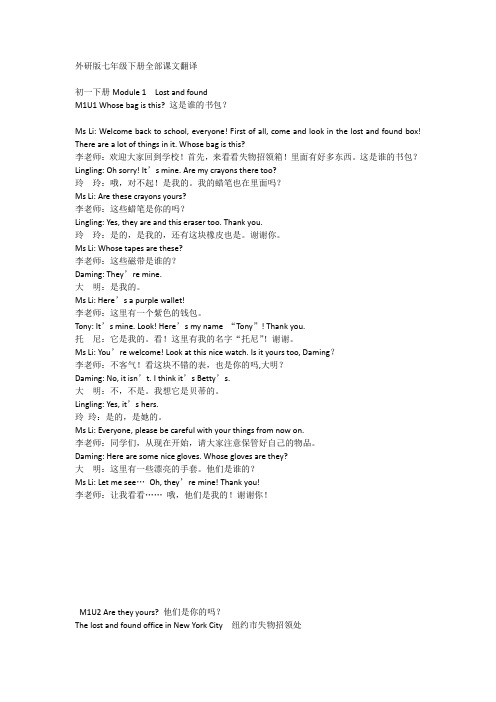
外研版七年级下册全部课文翻译初一下册Module 1 Lost and foundM1U1 Whose bag is this? 这是谁的书包?Ms Li: Welcome back to school, everyone! First of all, come and look in the lost and found box! There are a lot of things in it. Whose bag is this?李老师:欢迎大家回到学校!首先,来看看失物招领箱!里面有好多东西。
这是谁的书包?Lingling: Oh sorry! It’s mine. Are my crayons there too?玲玲:哦,对不起!是我的。
我的蜡笔也在里面吗?Ms Li: Are these crayons yours?李老师:这些蜡笔是你的吗?Lingling: Yes, they are and this eraser too. Thank you.玲玲:是的,是我的,还有这块橡皮也是。
谢谢你。
Ms Li: Whose tapes are these?李老师:这些磁带是谁的?Daming: They’re mine.大明:是我的。
Ms Li: Here’s a purple wallet!李老师:这里有一个紫色的钱包。
Tony: It’s mine. Look! Here’s my name “Tony”! Thank you.托尼:它是我的。
看!这里有我的名字“托尼”!谢谢。
Ms Li: You’re welcome! Look at this nice watch. Is it yours too, Daming?李老师:不客气!看这块不错的表,也是你的吗,大明?Daming: No, it isn’t. I think it’s Betty’s.大明:不,不是。
我想它是贝蒂的。
七下unit1课文
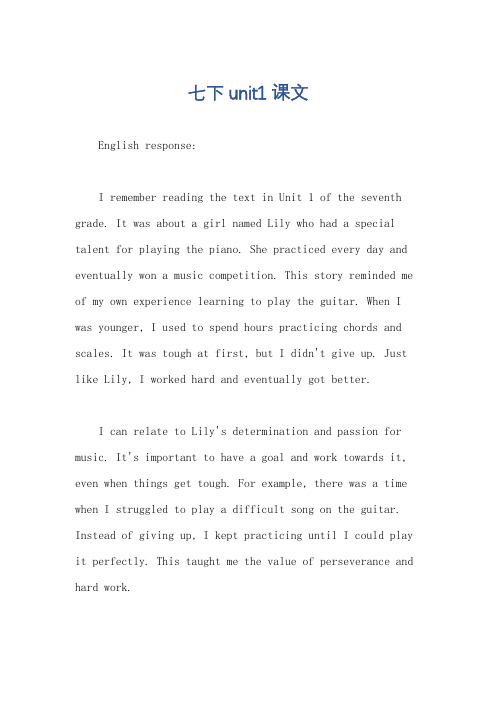
七下unit1课文English response:I remember reading the text in Unit 1 of the seventh grade. It was about a girl named Lily who had a special talent for playing the piano. She practiced every day and eventually won a music competition. This story reminded me of my own experience learning to play the guitar. When I was younger, I used to spend hours practicing chords and scales. It was tough at first, but I didn't give up. Just like Lily, I worked hard and eventually got better.I can relate to Lily's determination and passion for music. It's important to have a goal and work towards it, even when things get tough. For example, there was a time when I struggled to play a difficult song on the guitar. Instead of giving up, I kept practicing until I could play it perfectly. This taught me the value of perseverance and hard work.中文回答:我记得在七年级的第一单元中阅读了这篇文章。
- 1、下载文档前请自行甄别文档内容的完整性,平台不提供额外的编辑、内容补充、找答案等附加服务。
- 2、"仅部分预览"的文档,不可在线预览部分如存在完整性等问题,可反馈申请退款(可完整预览的文档不适用该条件!)。
- 3、如文档侵犯您的权益,请联系客服反馈,我们会尽快为您处理(人工客服工作时间:9:00-18:30)。
unit1
Section A 2d
Jane: Hi, Bob. What club do you want to join?
Bob: I want to join a sports club.
Jane: Great, what sports can you play?
Bob: Soccer.
Jane: So you can join the soccer club.
Bob: What about you? You are very good at telling stories. You can join the story telling club.
Jane: Sounds good. But I like to draw, too.
Bob: Then join two clubs the story telling club and the art club!
Jane: OK, let's join now!
Section B 2a
Hello, I'm peter. I like to play basketball. I can speak English and I can also play soccer.
Hi,I'm Ma Huan. I can play ping pong and chess. I like to talk and play games with people.
My name is Alan. I'm in the school music club. I can play the guitar and the piano. I can sing and dance, too.
2b Read the ads. Match the titles with the ads.
A. Help for old people
B. Music teacher wanted.
C. Help with sports in English
Are you busy after school? No? Can you speak English? Yes? Then we need you to help with sports for English speaking students. It is relaxing and easy! Please come to the Students' Sports Center. Call Mr. Brown at 2937742.
We need help at the old people's home. Are you free in July? Are you good with old people? Can you talk to them and play games with them? They can tell you stories, and you can make friends. It is interesting and fun! Please call us at 6897729 today!
Can you play the piano or the violin? Do you have time on the weekend? The school needs help to teach music. It is not difficult! Please call Mrs. Miller at 5553721.。
